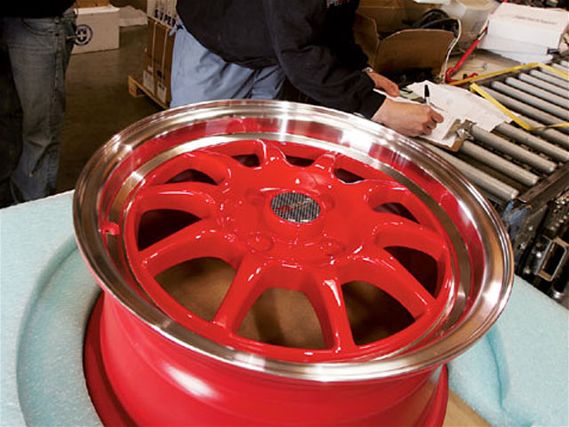 | Car Wheel Manufacturing - More Than A Numbers Game
| Car Wheel Manufacturing - More Than A Numbers Game
For some time now, the seeming criteria used by most people to assess wheel quality and general performance capabilities has been "weight." Although there is a general basis for this simple calculation, it's at best only part of the story.
Motorsport professionals, however, know to focus on additional points; wheel/rim deflection, stress/fatigue factors, basic design characteristic. They know from realtime experience that some wheels, due to inherent tendency of specific design and manufacturing processes perform superior to those of a corresponding wheel of lighter weight. Said another way, some wheels that weight a little more actually outperform ones that weigh less.
How is this possible? For starters, certain wheel designs absorb load and stress and then redistribute those forces throughout the wheel better than other designs. This improved absorbtion and redistribution leads to minimal wheel distortion. The higher the speeds and related stress factors the greater the potential for distortion. Minimized and reduced distortion equates to improved handling. Wheels that incorporate these characteristics routinely allow experienced drivers to dive into a corner faster, brake later, and accelerate sooner upon exiting the turn. In addition, you can further expect improved overall traction and quicker and crisper steering response as to driver demand.
So, if this absorbtion and distortion stuff is so important, why hasn't it been included in the numerous wheel articles over the years? Unfortunately, the resources to accomplish the above tests are not readily available to any magazine outfit. (Whereas weighing a wheel is a simple measure we do have the equipment for.) Weight allows for simple and general conclusions and should be understood as such.
To perform tests with simulation to the wheel manufacturer's level is a lengthy and costly endeavor. In addition, further realtime track testing is required and all of this adds up to huge expense. World-class Formula 1 teams test numerous components simultaneously in attempt to control track time test costs. So, while we don't have the resources of a Formula 1 team, at least you now know of additional specs you should investigate and consider before purchasing a set of wheels.
You might be asking, aren't wheels already tested by the manufacturers? Yes. While this is correct, those tests are basic dynamic rim roll, cornering fatigue, and retention tests with criteria that are significantly less demanding. The "bogeys" and standards that are the typical test criteria are more along the lines as to general automotive use and not to our performance desires.
The wheel manufacturing process is unique as to what can be typically expected from the wheel itself. Is it a one-piece cast, multi-piece, or traditional forged? Or possibly one of the recently introduced one-piece forged derivatives? Traditionally, one-piece cast wheels are lower in price and more likely to have certain limitations as you push the envelope to higher-level performance requirements. They remain the more popular choice of the basic consumer. Multi-piece and forged wheels cost significantly more and, as such, typically outperform the lower priced one-piece cast entries.
However, a new technology incorporating basic forging disciplines on the rim shell along with improved technology of heat treatment to the wheel center section has come out on the market. The advantage of this process is that it combines strength and lightweight properties at a significant savings when compared to a traditional forged product.
You may then ask: So where do I go from here when considering a high performance wheel? For starters, give considerable attention to the particular manufacturer. Are they a recognized name? Have they been in business for a long time? Who would be assisting you with your purchase? Do they seem knowledgeable? Does the manufacturer have a Web site where more information is present? Bone up on whatever data is available. How about racing; does the manufacturer actively "get at it" or is racing a six-letter word that they put on their corporate literature to hype the market?
Determine your price range and calculate a weight-to-dollar comparison. Ask lots of questions and talk to a factory rep if you can. Look and listen for evidence of real corporate performance involvement or in the end you just may be paying extra bucks for a wannabe performance wheel.
On the following pages we show you all of the wheels that fit the weight requirement, now it is up to you to determine which one of these wheels fit your own criteria.
